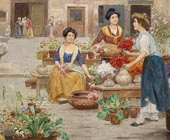 The book, Return to Order, describes how economy should not only satisfy physical needs, but also spiritual needs such as our appetite for beauty. In this way, both body and soul are satisfied. In addition, society as a whole benefits and culture develops.
The book, Return to Order, describes how economy should not only satisfy physical needs, but also spiritual needs such as our appetite for beauty. In this way, both body and soul are satisfied. In addition, society as a whole benefits and culture develops.
Thus, beauty and utility are complementary qualities in an economy. When goods and services reflect both physical and spiritual needs, they serve to facilitate transactions, improve relationships and create value. Embellishments of beauty often cost little but add enormous value.
APPLICATION: If the principle is that goods and services should include utility and beauty, then the practical application of this principle is to look for ways to embellish goods and services in daily life so as to develop yourself, society and economy.
Here are some examples:
- We might take the case of a restaurant that goes beyond just preparing food but finds little ways of presenting a meal in a pleasing manner. This is undoubtedly useful since it makes the act of eating attractive and less mechanical. It is both social and economic since such improvements facilitate conversation and attract customers.
- Imagine a case of a cashier who must check out groceries. He could simply process the transactions. However, if he develops manners and courtesy in dealing with those whom he serves, he will develop a personality that is pleasing to those around him. Such skills are useful since they help process the transactions. There are also attractive and beautiful since customers sense the human element of warmth that builds true trust and facilitates business.
- Suppose a craftsman builds a chair. He can either mechanically follow a blueprint or embellish his work with little adornments or moldings that will add charm and beauty to the chair. Such things complement the utility of the chair but create value by making it more inviting and agreeable.
- A teacher can faithfully do her job by following a syllabus and covering the material proper for the grade she is teaching. However, a great teacher is one who knows how to convey the beauty of the material she teaches. She uses all sorts of means to make the class more inviting and delightful.
- Leadership presents many opportunities for this union of the useful and the beautiful when serving the common good. It is fitting that a general carry out his function of leading his troops. His leadership takes on a special brilliance when he wears a uniform that celebrates the excellence of his office and his many acts of bravery in the form of medals and decorations. It incites others to follow him and show respect which will allow them to better do their duty.
- Any office that requires respect and reverence functions best when surrounded in the splendor that represents the office. Thus, a judge wears a robe, a lawyer a suit, a policeman his badge in a perfect union of the useful and beautiful that satisfies both physical and spiritual desires and benefits society.
- On a simple individual level, we might apply this principle by developing better vocabulary while working. Instead of relying on the annoying overuse of words such as “like” or ‘awesome,” those who make an effort to express themselves in novel ways add value to their work and facilitate communication. They also convey ideas more accurately and therefore more efficiently.
Thus, in our return to order, we should seek out ways to unite the useful  and beautiful. This union is the basis of true culture, literature and art. This union makes economy more human and makes business sense since it attracts people. It facilitates the practice of virtue since it increases our appreciation of that which we do. Beauty, says Saint Thomas, is the splendor of the truth. An organic Christian society is full of this splendor.
and beautiful. This union is the basis of true culture, literature and art. This union makes economy more human and makes business sense since it attracts people. It facilitates the practice of virtue since it increases our appreciation of that which we do. Beauty, says Saint Thomas, is the splendor of the truth. An organic Christian society is full of this splendor.
Perhaps our readers might have some other suggestions?


